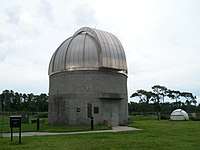Robinson Observatory
The Robinson Observatory is an astronomical observatory owned and operated by the University of Central Florida College of Sciences in Orlando, Florida, USA.[1]
 | |||||||||
| Organization | University of Central Florida College of Sciences | ||||||||
|---|---|---|---|---|---|---|---|---|---|
| Location | Orlando, FL, United States | ||||||||
| Coordinates | 28°35′30″N 81°11′26″W | ||||||||
| Established | 1995 | ||||||||
| Website | physics.ucf.edu/observatory.php | ||||||||
| Telescopes | |||||||||
| |||||||||
 Location of Robinson Observatory | |||||||||
Public viewings are held the first and third Wednesday of each month and are sponsored by the Central Florida Astronomical Society (CFAS).[2]
History
The observatory was built at a cost of over $500,000 in 1995, with Herbert Robinson donating almost half of the total cost. The observatory was given the name Robinson posthumously, eight months after Herbert Robinson's death, on April 25, 1996.[3]
In the 2000s, a number of updates and renovations were completed at the observatory. The most recent addition was in 2007; it included high speed internet, a new 20-inch (50 cm) Ritchey-Chrétien telescope, and the ability to remotely operate the telescope and dome.[4]
Future
Plans are under way to expand the Robinson Observatory to include two smaller telescopes with domes donated by the United States Air Force.
References
- "Robinson Observatory". UCF. Archived from the original on 2009-02-28. Retrieved 2008-11-11.
- "Robinson Observatory". Central Florida Astronomical Society (CFAS). October 3, 2007. Archived from the original on November 5, 2008. Retrieved 2008-11-11.
- "History - UCF Planetary Sciences Group". University of Central Florida Department of Physics. Retrieved 2009-06-10.
- "The Robinson Observatory Upgrade". CFAS. September 11, 2008. Archived from the original on 2008-05-18. Retrieved 2008-11-11.